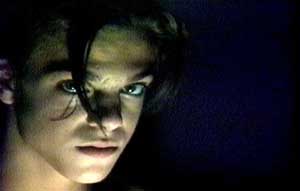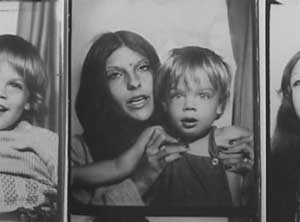-
- Schaefer wants public list of people with AIDS
- Same-sex marriage playing quiet role in elections that could decide its fate
- Judge rules conservative groups can join Calif. state defense
- Cincinnati voters deciding fate of ban on gay rights laws
- Second convict in Texas gay slaying executed
- Coburn says lesbian remark was taken out of context
- National News Briefs
- World News Briefs
Arts & Entertainment
What in Tarnation?
Jonathan Caouette talks about his stream-of-consciousness gay memoir
Published Thursday, 21-Oct-2004 in issue 878
With Tarnation, Jonathan Caouette has revitalized the American documentary. His extraordinarily personal, difficult-to-digest stream-of-consciousness memoir (his description), culled from 160 hours of material collected over 20 years, was made for the amazingly low, low price of $218 on his Mac, using Apple’s iMovie software. (Naturally, that does not include post-production work or the cost of prints and advertising.)
The result is, by turns, mesmerizing, self-indulgent, sad, funny, disturbing, surreal, touching, perverse and overpowering. “I can easily see why somebody would think it would be self-indulgent, because I refer to myself in the third person,” explains the congenial, 31-year-old gay actor/director by phone from Los Angeles, while doing a block of interviews. “There was this urgency to get this story out, and the only way it could get out was to tell it from my point of view. I don’t think it’s exploitative or self-indulgent. I grew up in this family. This is my world – take it or leave it, I guess.”
Aside from documenting his own turbulent life growing up in Texas (he literally matures before our eyes), the first-time documentarian turns his probing camera on his mother, Renee, a former model who for decades has grappled with acute bipolar disorder and schizoaffective disorder, and the grandparents who raised him, Adolph and Rosemary, who authorized two years of shock treatments for their daughter after she was suspected of being mentally ill. As much as he is on screen, Caouette believes Tarnation (the title means damnation, or hell), is his mother’s story (“She is a victim of the Texas mental health system”), which he tells using home movies, pop music, clips from old films, answering machine messages and photographs.
A self-described pop-culture junkie, Caouette turned to filmmaking as a “means of dissociation and escape.” He is, he says, “pretty much who you see [on screen]. I’m somebody who never had a stable family that [taught me] structure. As a child I had to de-program myself in the way that someone who was brought up in a religious cult might do. If you look beneath the surface, you see somebody who’s very much trying to find himself. Being gay, and wanting to create, I think that all comes out.”
While he is of the opinion that his entire family was dealt a “shoddy hand of cards,” Caouette never thought “for a moment” that “anybody in my family didn’t love each other, even down to my grandparents administering shock treatments to my mother. I never thought that was done out of vindictiveness, or anything like that. They were just a little slow, and very prone to the power of suggestion. They weren’t really fit to be parents in the traditional sense. They did what they thought was right. We were a very loving family. There was always love being filtered through all that insanity.”
In one of Tarnation’s numerous unsettling moments, Renee, now a shadow of herself (she has since improved and her condition is currently in remission), giddily extols in song the virtues of a pumpkin. Caouette intentionally lets the scene run on as a way of illustrating “just what it’s like to deal with mental illness. What it’s like for me to deal with it, what it’s like for you to deal with it, what it’s like for her to deal with it. She’s not convulsively laughing or going crazy, she’s just being silly. It’s important that people not automatically round off mentally ill people to the nearest hoo-ha or drug addict, or be afraid of them.”
Why Tarnation, now? “Technology has enabled me to [tell this story], first and foremost,” Caouette replies. “Second of all, I think it’s a really important film because it will enable people to rekindle and reconnect with the human condition. As sappy and clichéd and strangely political as that might sound, I think we live in some very, very disturbing times. We are so disconnected, in the most serious, dangerous ways. This may sound like a hypocritical statement, because I made the movie on a computer, but I think technology is beginning to dehumanize people.”
If you find it challenging to get through the 88 intense minutes that comprise Tarnation, imagine experiencing its other incarnations, including the original three-hour edit. One version was filmed so as to not reveal Caouette’s identity. “So I slapped a fictitious ending on it, where my grandfather pulls out a gun and shoots me.” Another cut suggests his family might be part of a medical experiment. In order to make it more festival friendly – it would go on to win the Best Documentary award at the Los Angeles Film Festival – Caouette kept pruning and redefining the film, turning in the final edit just in time for the MIX Film Festival. Fellow gay filmmakers John Cameron Mitchell and Gus Van Sant championed the movie by signing on as executive producers.
But was Tarnation really made for a mere $218, or is that PR hype? “I swear on my mother’s life, and may I go straight to hell [if I’m lying], that it’s true. It was made for a couple hundred bucks. The great thing about it is that now it’s an official, low-fi-appearing film with kick-ass sound. Lora Hirschberg at Lucasfilm took all the music and my sound design, separated it, amped everything up, and finessed it in a way that sounds glorious.”
Asked how it feels to watch himself on screen, Caouette says it’s hard to be objective because “I’m so in the thick of it right now.” He confesses to “cringing” each time he sees the scene, filmed at age 11, where he improvises a powerful monologue by a battered wife – a version of his mother – named Hillary Chapman Laura Lou Gourinna. “It’s very awkward and embarrassing – that was pulled out of thin air. It almost seems like a channeling or [demonic] possession. Sometimes I have to laugh out loud; not because I’m laughing at it, but as a defense mechanism. All in all, I say, wow, that was me – look who I am now. Isn’t that interesting, Jonathan?”
Having recently secured an apartment in Texas for his mother and grandfather (whom he believes may be in the beginning stages of Alzheimer’s), Caouette plans to join them there (temporarily) after his press tour ends. He intends to set up an editing bay in the residence and stay in Texas for six to nine months to work on his next project (a remake of an unidentified ‘70s rock musical), and “get my mother and grandfather to a little more of a stable place. I can’t finish the life of this movie soon enough.”
No accident that Caouette was drawn to underground films (“Pink Flamingos, shit like that”) as he was finding himself, because Tarnation just may be the ultimate underground movie. “Omigod – don’t say that,” he laughs, not wanting to sound narcissistic by agreeing with that categorization. “Are you serious?” He mulls the description over for a few seconds and brightens. “You know, I would rather call it that than a documentary. If people want to call it a documentary, they can call it a documentary. But you know what? At the end of the day, it’s cooler to say it’s an underground film.”
|
|
Copyright © 2003-2025 Uptown Publications





